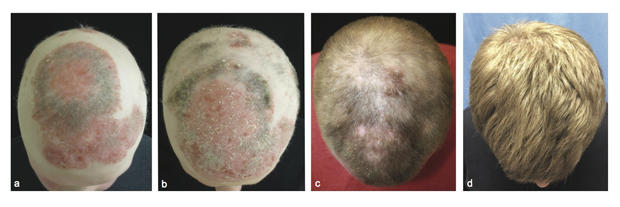A novel treatment involving the use of an arthritis drug helped a 25-year-old man grow a full head of hair after a rare disease left him completely hairless.
There is no known cure for alopecia universalis -- the autoimmune disease that the man suffers from, which causes a loss of all body hair. Yale researchers came up with an effective targeted treatment that helped the patient grow his hair back, including eyebrows, eyelashes, facial hair and body hair.

"The results are exactly what we hoped for," Dr. Brett A. King, assistant professor of dermatology at Yale University School of Medicine and senior author of a paper outlining the results online in the Journal of Investigative Dermatology, said in a statement. "This is a huge step forward in the treatment of patients with this condition. While it's one case, we anticipated the successful treatment of this man based on our current understanding of the disease and the drug. We believe the same results will be duplicated in other patients, and we plan to try."
The patient in the study had also been diagnosed with plaque psoriasis , a condition characterized by scaly red areas of skin. The only hair he had was within the psoriasis plaques on his head. He went to Yale Dermatology to get treated for the psoriasis; he had never been treated for the alopecia.
An estimated 30 million Americans suffer from one of 7,000 rare diseases, many of which can't be treated
When King examined the patient, he thought that both diseases could be addressed with the use of a single drug for rheumatoid arthritis called tofacitinib citrate. The drug had been used to treat psoriasis in people and it had been effective at reversing a less extreme from of alopecia in mice .
"There are no good options for long-term treatment of alopecia universalis," King said. "The best available science suggested this might work, and it has."
Indeed, after two months of treatment with 10 mg of the arthritis drug a day, the patient's psoriasis showed some improvement. And, for the first time in seven years, the man had grown scalp and facial hair. After three more months of therapy at 15 mg a day, the patient completely regrew scalp hair and started regrowing eyebrows, eyelashes, facial hair, armpit and other hair.
"By eight months there was full regrowth of hair," study coauthor Dr. Brittany G. Craiglow, said in a statement. "The patient has reported feeling no side effects, and we've seen no lab test abnormalities, either."
Tofacitinib citrate seems to trigger hair growth by turning off the immune system attack on hair follicles that is prompted by the disease, King said.
The drug helps in some cases of psoriasis, and it was mildly effective in treating this patient's psoriasis, the researchers said.
King has submitted a proposal for a clinical trial involving a cream form of the arthritis drug as a treatment for a less extreme form of alopecia, which causes a hair loss that is typically less extensive than alopecia universalis.



























